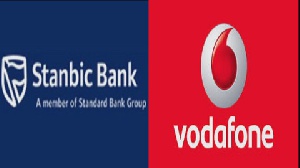Accra, Stanbic Bank Ghana in partnership with Vodafone is organising the maiden edition of the Women in Entrepreneurship Workshop on the 14th and the 15th of May, 2018. The 2-day workshop, which is a follow up on Stanbic Bank’s Lionesses of Africa programme, will host about 60 women who will be taken through the rudiments of running a successful business.
The role of women in economies in Africa and in Ghana in particular has often been defined and restricted along biological and cultural lines. Historically, women have been disadvantaged when it comes to economic ventures and this has marginalized women and belittled their role in political economies. These notwithstanding, there is evidence that bares testimony to the fact that women have enormous influence and impact in the transformation of economies in both developed and developing countries. From start-ups to small to medium sizes, women play significant roles in the entrepreneurial space.
Speaking on the rationale for the workshop Doreen Kweiba Iliasu, Head - Legal, Stanbic Bank Ghana, said the workshop was conceived to help women overcome the many challenges they face in the entrepreneurship space. “We came up with this initiative in recognition of the struggles of women in entrepreneurship and the need to help them overcome the challenges and succeed. From Stanbic we have two messages for you: the first, for women, we say Stanbic Bank is here to help you move forward; the second, which is to everyone, we emphasize that advancing women is good for business, good for society and great for Africa’s prospects”, she said.
Commenting on Vodafone's partnership with Stanbic, Angela Mensah-Poku, Director of Enterprise Business Unit at Vodafone Ghana said:
"We are particularly excited about this initiative for two key reasons. To begin with, female entrepreneurs form 35% of the over 4,000 SMEs we engage through our various activities across the country. Secondly, Vodafone is very passionate about Diversity and Inclusion and continues to drive gender equality in every aspect of our operations. Our preoccupation is to make women entrepreneurs ready for the future; to compete on the international level and to be the shining light in using modern digital trends and platforms to thrive in their businesses. We will continue to find ways to provide opportunities for businesses to realize their ambitions for the future”.
The female labour force participation rate in Ghana is estimated at 50.5%, and women account for about 50.2% of the entire population of Ghana (Ghana Statistical Services, 2014). It is estimated that some 80% of women in Ghana are engaged in various economic activities and they predominate in the informal micro-small to medium scale agriculture, manufacturing and services sectors of the economy.
Women in Ghana participate in labour markets on an unequal basis with their male counterparts. In 2017, the male employment-to-population ratio stood at 72.2%, while the ratio for females was 47.1 % (ILO, 2017). The formal sector employs about 6.2% of women, 3.3 % in the public sector and 2.9% in the private sector (Ghana Living Standard Survey GLSS6, 2016).
In a bold attempt to mitigate the challenges that face both potential and existing Ghanaian entrepreneurs, Stanbic Bank Ghana continues to provide entrepreneurial capacity development to young Ghanaians through a broad spectrum of incubator projects aiming to develop skills relevant in today’s fast paced tech-driven world.
Business News of Monday, 14 May 2018
Source: Vodafone Ghana

















